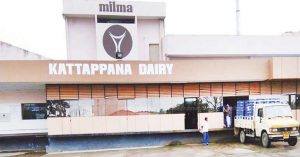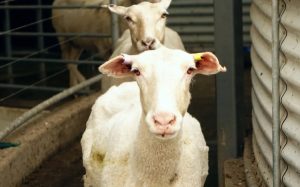“Eh ta meri bebe hai,” said Dalbir Singh, (she is my mother) looking at his distraught mother. He then identified his sister. One after the other, he called out the names of familiar faces among the villagers who came with his family. The small crowd cheered every time he joined names to faces correctly — a task for his unstable mind.
“Chalo chaliye ghare. Mainu ta ithe koi chhad gya,” (Let us go home. Someone had left me here), he said in Punjabi. Dalbir, a Dalit from Haryana’s Fatehabad, had been missing for 10 years. In August 2021, he was found living a slave’s life 250 km away in a farm in Punjab’s Fazilka.
Pal Khroud, an anti-slavery activist and farmer in Punjab who led the search, said he was tipped off that Dalbir was being kept as a slave, allegedly by a farmer called Gurcharan Singh.
When Dalbir was rescued in August 2021, his relatives reached Gurcharan’s home located near his farm where a farmers’ union flag fluttered atop a tractor. And they were enraged.
In a video shared by Khroud, Dalbir’s sister can be seen shouting at Gurcharan, “I had two brothers. One of them died worrying about his missing brother. And we got older trying to find him. You exploited our brother for 10 years.”
Pal asked the farmer, “It has been more than 10 years. Why didn’t you send this man back home? He even told you his family’s address.” In the video, another man, a Nihang Sikh, barged forth shouting, “You have brought disgrace to Sikhi. You are an ex-serviceman and you have brought disgrace to the Indian Army.”
The Quint visited Gurcharan’s residence soon after. “I kept Dalbir as a family member. We had found him on the road outside a religious place wearing rags, and hungry. We brought him home and fed him. Then he started working in our fields. Some of our relatives are not on good terms with us. They presented the case in completely different way,” said Gurcharan.
“He used to go out to cut cattle fodder for fun,” said Gurcharan, who had 35-40 heads of cattle in a small farm.
To avoid legal battle, Dalbir’s family agreed to compromise with Gurcharan on the promise of Rs 3 lakh as compensation.
Modern-Day Slavery
He wasn’t kept in shackles but the term ‘slave’ defines the life Dalbir, now 35, lived. He is one among the hundreds of mentally unstable people who were found being kept as slave labourers in Punjab in the last three years. In March 2021, the Ministry of Home Affairs wrote to the Punjab government about how the Border Security Force had rescued 58 people, who were kept as bonded labourers by farmers in the border areas of Gurdaspur, Amritsar, Abohar, and Firozpur. The Ministry said that most of them were from Uttar Pradesh and Bihar, and were either mentally handicapped or had unstable mind.
Cases of modern-day slavery are being regularly brought out by Patiala-based Pal Khroud, the founder of Apna Farz Society (Our Duty Society), and Manjot Singh of Guru Aasra Sewa Society in Hoshiarpur. Both have teams of volunteers to ferret out leads from social media on people being kept as slaves, and then verify and raid them—which displays shades of vigilantism.
Videos of them scouting dairy farms or fields in search of mentally unstable persons kept as bonded workers, and sharing the lost-and-found joy of families have gone viral. Pal’s YouTube channel has more than two lakh subscribers and more than two crore views while Manjot’s channel is subscribed by over 75,000 people and has 67 lakh views.
Dalbir’s sister Sukhwinder Kaur (34) said that she approached Pal after losing hopes of finding her brother.
“It had been more than 10 years. When we found Dalbir, he was cutting fodder. He threw the sickle when he saw our mother and me. He clasped my hands and cried saying let us go to our village. He told our mother that he came here on a train and then he took lift on a bike.”
Dalbir’s sister Sukhwinder Kaur
His sister claimed that Dalbir told her that Gurcharan Singh used to beat him up sometimes. “We can’t confirm what my brother is saying. Sometimes he forgets things,” she said.
“After my father died, Dalbir was depressed and used to say it’s not easy to live without our father. He left home when he was just 25-years-old. My elder brother Kashmir (37) spent at least Rs 1 lakh trying to locate Dalbir. He died of a cardiac arrest,” Sukhwinder had told Pal.
And for now, they have kept his brother’s death a secret from Dalbir.
Dalbir’s family claim to have once filed a missing person complaint but no longer have a copy of the complaint or the FIR due to “no-action”.
According to the last available report, “India has the highest number of slaves in the world, with estimates ranging from 14 million to 18 million people”. The Global Slavery Index defines modern slavery as a situation where “a person cannot refuse or leave because of threats, violence, coercion, abuse of power or deception, with treatment akin to a farm animal”.
Tortured to Forget
In Punjab, the scourge of mentally handicapped being kept as slaves is emerging as a sub-set in the umbrella term of modern slavery, which includes human trafficking, debt bondage, forced labour, and child marriages.
Manjot Singh of Guru Aasra Sewa society said, “In Punjab, dairy farming is a huge industry. Some people have set up farm houses in fields. It’s expensive to clean and clear dung. A few people in Punjab have found a workaround — ‘buy’ mentally unstable people for around Rs 10,000-15,000 and force them to work”.
“They are tortured so much that they even forget their village name, and limit their life to feeding cattle and clearing dung. It is a tragedy for Punjab. We know of many such cases but due to limited resources and space at our shelter, we can’t help free everyone.”
Manjot Singh of Guru Aasra Sewa society
Neither the government nor police supports them, claims Manjot. “After rescuing people, sometimes we want to file FIRs but the police usually refuses to register an FIR.”
“If the police start searching dairy farms, then I think thousands of people can be rescued.”
Manjot Singh
“Till now we have freed nearly 100 people from slavery. At least 50 people are staying with us,” said Manjot.
Surinder Singh is one of them. He went missing at a mela in a gurdwara in Hoshiarpur.
Guru Aasra Society — the Good Samaritans
In the first half of November 2020, volunteers of Guru Aasra found that a person—identified as Surinder Singh—was being forced to work without pay at a dairy farm. The organisation traced his family to Karnail Ganj, a village in Bhulath Tehsil in Punjab’s Kapurthala district, and took them to meet him. Surinder’s mother, Satya Kaur, 70, walked to the farm to meet him. He came out, incoherent and filthy. And they hugged and cried, surrounded by buffaloes, cows, calves, and the stink of dung. He fell on the ground and cried some more. Surinder, also known as Sadhu, identified his maternal uncles who had come to rescue him.
Surinder’s mother said her son is a Sikh and had a beard, which didn’t exist anymore. “When we asked his name, he said ‘Binder.’” His mother cut him off and told him that your keepers gave you that name. “Your name is Surinder Singh,” said Guru Aasra Society’s Manjot.
Satya Kaur said, “I am uneducated, I don’t remember when my son went missing but it must be around nine years ago. We made efforts to locate him and even went to Tihar jail in Delhi because we were told that Sadhu was there.”
She said, “Sadhu is mentally handicapped but can identify his family members and villagers. The main problem was that he can’t name his village”. Satya Kaur showed us an injury on Sadhu’s head, which she said was from the beatings he had received. Surinder said they used to make him clear dung.
Though they belong to the OBC Lubana caste whose members mostly emigrate to western countries, Surinder’s family is relatively poor. His mother said that they sold three acres to fund the search. Surinder’s father, and his two siblings are no longer alive, and the sole earning member of the family is his elder brother, who works at a fruit farm in Portugal.
Sher Ali Khan, who is accused of keeping Surinder captive, said that Surinder came to him himself and said he wanted to live with their family. “We allowed. Around five years ago, some people had come to take him but he refused,” clamed Sher Ali.
He also accepted that he did not want Surinder to leave his dairy farm where he has 60 milch animals to look after.
“We used to feed him well and even buy him beedis,” said Sher Ali, and denied cutting Surinder’s hair and beard. His family reached a compromise with him, who agreed to pay a compensation of Rs 4.5 lakh.
While Pal and Manjot are playing the part of good Samaritans, the complete absence of due process in busting slavery short-circuits justice to the victims. Much of the exploitation goes unpunished due to slow legal process which scares the victims from approaching the courts.
The Punjab government too, is yet to recognise the human rights crisis blowing up in their backyard despite rampant instances of slavery. The government has at its disposal emergency buttons to push but is yet to move a finger.
Section 13 of The Bonded Labour System (Abolition) Act 1976 empowers the state government to constitute vigilance committees in each district and each sub-division, led by a district magistrate and a subdivisional magistrate, respectively. Central scheme for rehabilitation of bonded labourers has provisions of Rs 1 lakh as assistance to the freed ‘slave.’ In special cases, the assistance can go up to Rs 3 lakh. It also calls for allotment of land for house and agriculture, provision of low-cost dwelling units, animal husbandry, wage employment and enforcement of minimum wages, supply of essential commodities under public distribution system, and education for children.
The families that The Quint spoke to said that they have not yet received any benefits and nor has anybody gone to jail under the Bonded Labour System Abolition Act that prescribes a three-year jail term for the accused.
Additional Chief Secretary of Labour, Punjab, VK Janjua didn’t respond to a request for comment.
More Bloodcurdling Instances
And then there is the story of Kindar Singh from Punjab who was found alive last year as a slave in a dairy farm in Rajasthan’s Ganganagar —10 years after he was presumed to be dead. His wife Rajwinder Kaur said, “I was just 36-years-old when he had left home to meet his sister in Faridkot district. We think he was kidnapped.”
His wife said her husband was not mentally disabled but was gullible.
He was underfed for years, and now has trouble digesting a normal portion of food. He was brutally beaten up “for small mistakes”. He was forced to sleep “on the floor in a room full of buffaloes and cows” and now he has trouble falling asleep in his room, said Kindar’s family.
Rajesh Kumar, Kindar’s alleged enslaver, said, “Nearly 10 years ago, my father Karmajit found him injured on a highway and brought him home. After 3-4 days, we took him to doctor who said Kindar was a drug addict. He used to have 100-150 grams of poppy husk in a day. We kept him as a family member, never chained him. We did not force him to work. Our family is political and it is the reason we got targeted.”
National Committee Campaign for the Eradication of Bonded Labour (NCCEBL) convener and social activist Nirmal Gorana said, “The government needs to conduct surveys and free those who have been enslaved. There is a provision for vigilance committees on district and sub-divisional levels to find and free slaves. It is their duty to free slaves and rehabilitate them. Most of them don’t know what to do. In most cases, vigilance committees favour enslavers, not slaves.”
Rohit Chaudhary, Punjab Police Special DGP/ Human state Rights Commission said, “There is not much data available on the issue. I don’t have much idea.”
(This story was reported under NFI Fellowships for Independent Journalists.)

















